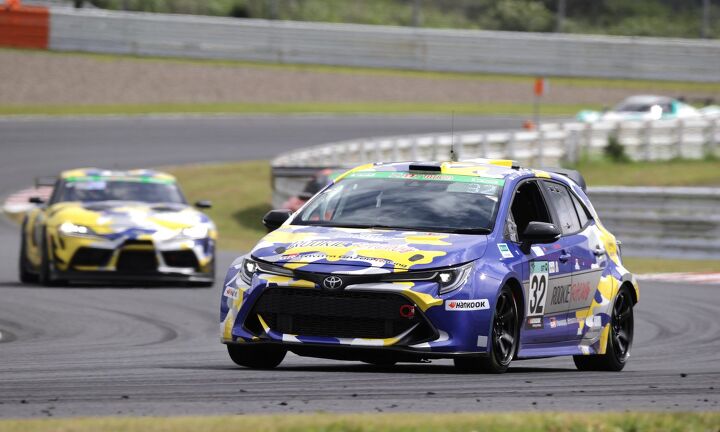Fire Puts Hydrogen-Powered Corolla Racer Out of Action

Toyota’s hydrogen-powered GR Corolla caught fire while testing at Fuji International Speedway last week, putting the vehicle out of action for the foreseeable future. The #32 ORC Rookie GR Corolla H2 Concept was designed as a proof of concept that fuel-cell vehicles can make excellent racers, that Toyota’s pursuit of hydrogen power hasn’t been in vain, and that net-zero emissions are achievable.
It was also supposed to compete in the first round of the ENEOS Super Taikyu Series 2023 sponsored by Hankook this weekend. However, Toyota has elected to run with the gasoline-powered ORC Rookie GR Yaris while the hydrogen model remains out of action.
With numerous automakers once again praising hydrogen as an alternative energy option, the fire has stripped Toyota’s ability to brag that it was correct all along. Then again, race cars catch fire more often than you might imagine and this may not be indicative of any shortcomings with the technology. The manufacturer seems to be making this case, too. Based on this week’s press release, the alleged culprit was nothing more than a pipe fitting rattling loose after sustained testing.
From Toyota Gazoo Racing:
During a private test run at Fuji International Speedway on March 8, a vehicle fire occurred due to a hydrogen leak from a gaseous hydrogen pipe in the engine compartment. Consequently, we could not recover the vehicle in time and were forced to abandon the race. Instead, we plan to participate with the ORC ROOKIE GR Yaris (gasoline engine).
We apologize for the concern this may cause the many people looking forward to seeing the hydrogen-powered Corolla on the track.
The hydrogen-powered Corolla in the March 8 test run used liquid hydrogen. However, the vehicle fire was not directly caused by the fuel change from gaseous hydrogen to liquid hydrogen. The cause is seen to be the loosening of a piping joint from vehicle vibration, resulting in a hydrogen leak. As the piping joint is located near the engine, the leaked hydrogen ignited when heated.
It was found that the hydrogen leak sensor fail-safe functioned properly so that the hydrogen supply was shut off, avoiding a significant spread of the fire. As a result, the cabin was protected, and the safety measures for the occupants were confirmed.
The rest of the car wasn’t so lucky and sounds like it’s going to be out of commission for a while. Toyota’s racing team has said it would like to review the piping design that caused the hydrogen leak so that it can continue building safer vehicles.
While your author is ready to be skeptical about the future of hydrogen vehicles over questions pertaining to its lackluster fueling infrastructure and the fact that production uses methane gas while emitting a significant amount of carbon dioxide, it’s harder to chide Toyota for chasing down novel technologies. Even if green hydrogen (based around electrolysis using renewable energy sources) turns out to be impossible, it doesn’t seem fair to lambast someone for trying something new.
But this remains an embarrassing moment for one of the companies that haven’t given up on hydrogen-powered vehicles, as the general public won’t be looking at the efficiency breakdowns of hydrogen production. They’ll just look at the headline, note that a hydrogen-powered Toyota caught fire, and get on with their day a little more skeptical of the technology than they were before.
[Image: Toyota]
Become a TTAC insider. Get the latest news, features, TTAC takes, and everything else that gets to the truth about cars first by subscribing to our newsletter.

A staunch consumer advocate tracking industry trends and regulation. Before joining TTAC, Matt spent a decade working for marketing and research firms based in NYC. Clients included several of the world’s largest automakers, global tire brands, and aftermarket part suppliers. Dissatisfied with the corporate world and resentful of having to wear suits everyday, he pivoted to writing about cars. Since then, that man has become an ardent supporter of the right-to-repair movement, been interviewed on the auto industry by national radio broadcasts, driven more rental cars than anyone ever should, participated in amateur rallying events, and received the requisite minimum training as sanctioned by the SCCA. Handy with a wrench, Matt grew up surrounded by Detroit auto workers and managed to get a pizza delivery job before he was legally eligible. He later found himself driving box trucks through Manhattan, guaranteeing future sympathy for actual truckers. He continues to conduct research pertaining to the automotive sector as an independent contractor and has since moved back to his native Michigan, closer to where the cars are born. A contrarian, Matt claims to prefer understeer — stating that front and all-wheel drive vehicles cater best to his driving style.
More by Matt Posky
Latest Car Reviews
Read moreLatest Product Reviews
Read moreRecent Comments
- Lorenzo They won't be sold just in Beverly Hills - there's a Nieman-Marcus in nearly every big city. When they're finally junked, the transfer case will be first to be salvaged, since it'll be unused.
- Ltcmgm78 Just what we need to do: add more EVs that require a charging station! We own a Volt. We charge at home. We bought the Volt off-lease. We're retired and can do all our daily errands without burning any gasoline. For us this works, but we no longer have a work commute.
- Michael S6 Given the choice between the Hornet R/T and the Alfa, I'd pick an Uber.
- Michael S6 Nissan seems to be doing well at the low end of the market with their small cars and cuv. Competitiveness evaporates as you move up to larger size cars and suvs.
- Cprescott As long as they infest their products with CVT's, there is no reason to buy their products. Nissan's execution of CVT's is lackluster on a good day - not dependable and bad in experience of use. The brand has become like Mitsubishi - will sell to anyone with a pulse to get financed.




































Comments
Join the conversation
Which is better: burning Li-ion battery or exploding H2 tank?
The battle of hydrogen vs electric cars reminds me of the beta vs VHS battle.